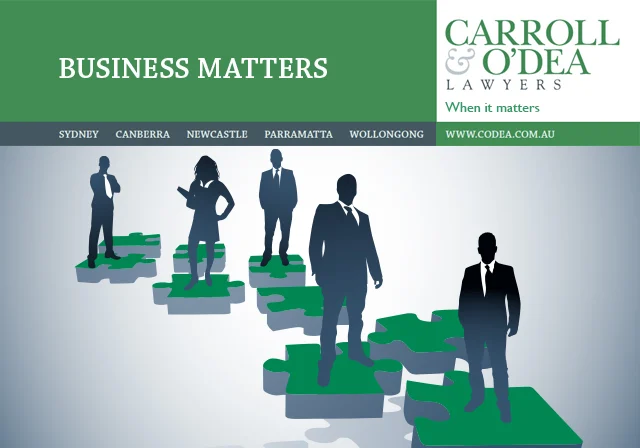
Business Matters Newsletter – November 2013
Published on November 20, 2013 by Selwyn Black
ON THE INTERNET, NOBODY KNOWS YOU ARE A PROLIFIC DEFAMATION PLAINTIFF
Internet defamation cases keep courts busy all over the east coast
There have been a lot of Internet defamation cases in the past 2 years, including several by a Victorian figure named Trkulja. Mr Trkulja has succeeded in suing Google and Yahoo, including complaints over automatically generated image captions.
In Trkulja’s most recent proceedings, he is suing a blogger for defamation. The blogger had been commenting on Trkulja’s earlier defamation cases.
We do not propose to comment further on Trkulja’s litigation.
A number of other plaintiffs have tried to sue Google Australia for search engine content. Google Australia is invariably successful in having these actions dismissed by the Courts, because it has no responsibility for, or control over, search engine content. This means that plaintiffs are required to endeavour upon international litigation by suing the United States parent company, Google Inc.
Recently in the United States, a court delivered a decision on the SPEECH Act. The key provisions are now found section 4102 of title 28 of the U.S. Code, and prevent United States courts from enforcing defamation judgments of other countries, unless the plaintiff can prove that the judgment would have been actionable under United States law.
In the case of Google, under United States law it receives almost impenetrable protection against defamation claims because it is a provider of an Interactive Computer Service, which publishes third party content.
The practical effect of the United States law is that even if an Australian plaintiff were to sue any United States defendant for defamation here:
- the plaintiff would have to run their case twice (and win twice) – once here, and once in the United States; and
- for defendants like Google, there is virtually no prospect of getting an enforceable judgment unless the plaintiff can show Google itself was responsible for all of the offending content.
There is no corresponding protection for Australian providers of Interactive Computer Services, which puts them at a significant disadvantage compared to their United States competitors.
Australian based Interactive Computer Services should consider relocating their publishing companies and service operations to the United States if they publish third party content that could be defamatory.
Troy Rollo (trollo@codea.com.au) Ph: (02) 8226 7358
THROWN OUT MEANS STRUCK OUT
Court acts to deal with electronic file shredding
On 22 October 2013 Justice Jagot of the Federal Court struck out major parts of a defence filed by a David Brooke in response to a claim brought against him by his former employer Moody Kiddell & Partners Pty Limited (MKP). MKP had alleged that Brooke had used confidential information from his employment with MKP in a new business.
The lawyers for MKP had from the outset requested that Brooke’s lawyer draw their client’s attention to his obligations to maintain and not destroy records which may be required for the purposes of the dispute.
After the apparent non production of certain emails known to exist, a forensic computer consultant gave evidence which the Court upheld and found that there had been deliberate document destruction, using specialised software designed to irretrievably destroy data. The judgment also records that searches by MKP’s forensic examiner found that Mr Brooke’s work computer was used to carry out a search on Google “Is Guttman 35 shredding better than department defence”, as well as being used to look at other searches including “shred files and wipe disks”, and “what happens if you don’t comply with a court order”. Ooops.
In reaching a decision to strike out parts of the defence, the Court relied on a number of decisions including a 2002 case involving British American Tobacco. The Court made the order even though Mr Brooke, via his lawyer, suggested that the material, or most of it, could be provided another way.
We suspect there is a big future for those skilled in forensic computing examination!
Selwyn Black (sblack@codea.com.au) Ph: (02) 8226 7359
I’m Late…For Business

AVAST YE MATEY
Alleged broadcasting channel pirate sentenced to a month in the brig
In May of this year, the Federal Court sentenced an alleged broadcasting channel pirate to imprisonment for 1 month for breaching an injunction against providing access to certain foreign language channels over the Internet. The sentence was suspended, with conditions.
In Connect TV v All Rounder Investments, Connect TV was the exclusive broadcasting licensee within Australia for a number of Russian language television channels. The respondents were alleged to be engaged in a business of reselling access to an Internet service located outside of Australia, which streamed those channels over the Internet. The respondents’ customers were within Australia.
Connect TV obtained an interim injunction restraining the respondents from reselling access to the Internet service – just 8 days after commencing proceedings.
Some of the respondents continued to take orders for the offending Internet service, including by setting new companies and Internet domain names to conduct the business, which involved getting assistance from some friends and relatives.
The Court found several of the respondents guilty of contempt, and ordered fines of up to $30,000, and in one case a suspended term of imprisonment for 1 month.
Troy Rollo (trollo@codea.com.au) Ph: (02) 8226 7358
DISCLOSURE CHANGES FOR RETIREMENT VILLAGES IN NEW SOUTH WALES
In an attempt to simplify the retirement village industry, the New South Wales Government has required that three new documents be issued to prospective occupiers in retirement villages:
The general enquiry document which gives a basic explanation about the village, including financial matters such as recurring charges, departure fees and details as to whether residents participate in capital gains.
The disclosure statement which has to be given to potential residents at least 14 days before they enter a contract with the village. This gives more detail including on issues such as services, management, financial issues and rights. If the material in this statement is materially false or misleading, a resident can apply to rescind their contract within 3 months of commencing occupation.
The standard retirement village contract is now intended to be easier to read and to allow comparison of costs and conditions between different villages. There are five template contracts for the five most common village types.
Retirement village operators can insert additional terms, but they have to make sure that those terms are consistent with the Retirement Villages Act and prescribed contract terms.
Selwyn Black (sblack@codea.com.au) Ph: (02) 8226 7359
HUNGER PROJECT APPEAL
The Australia Taxation Office has appealed against a Federal Court decision in the case of The Hunger Project Australia v Commissioner of Taxation. The Court ruled that it was proper to treat the applicant as a “public benevolent institution” for the purposes of s57A(1) of the Fringe Benefits Tax Assessment Act, even though its main activities were public fundraising rather than the direct provision of services.
Selwyn Black (sblack@codea.com.au) Ph: (02) 8226 7359
DRILL RIG BREAKS EXCLUSION CLAUSE
Who reads the back of invoices anyway?
Earlier this year the Western Australian Court of Appeal dismissed an appeal by La Rosa against Nudrill Pty Limited, over an earlier finding that La Rosa was liable for damage which occurred to a drill rig in transit. La Rosa had previously provided delivery services, in each case providing an invoice which had a term on the back seeking to excuse it of any liability for negligence.
The Court looked at the test for determining whether a term has become part of a contract based on prior dealings. It said that we weren’t dealing here with a term implied as a matter of trade custom or usage or law. The Court also said that in order for a term to be imported into a contract, it wasn’t necessary that it had been incorporated into any previous contract between the parties. The Court suggested that the test was whether the party seeking to rely on a term had done what was reasonably sufficient to give the other contracting party notice of the term, before the contract was made.
With this in mind, you will often see signage at the entrance to a car park, and be given the opportunity to exit without payment if you don’t agree with the conditions. In this reported case the carrier couldn’t prove that reasonable notice had been given of the exclusion clause conditions, such that they formed part of later contracts.
Selwyn Black (sblack@codea.com.au) Ph: (02) 8226 7359
SHOW ME THE MONEY – ALL OF IT
New South Wales beefs up protections against excessive entertainment industry agency fees
On 1 October 2013, the Governor signed the Entertainment Industry Act 2013. This Act will replace the Entertainment Industry Act 1989.
The Act will remove the licensing scheme and the requirement to lodge bonds, and instead:
- increase the maximum fines for breaches to $11,000 (up from $5,500);
- provide civil penalties of up to $10,000 for breaches of the Act or the code of conduct; and
- provide for the Supreme Court to issue prohibition orders against anybody found unsuitable to act as a manger or agent.
As with the prior version, the new Act and its regulations limit the fees that entertainment industry agents can charge. The Act provides for managers to avoid these caps if they have a written management agreement that meets the requirements of the Act and the talent will have a cooling off period after signing that agreement.
As before, talent agents will be required to keep trust accounts, if they receive any money on behalf of the talent. Talent agents and venue representatives will be required to pay on any money they receive within 14 days. Talent hirers will be required to pay the talent within one month (but if the agreement states an earlier time, then the earlier time applies).
Agents and managers will also be required to inform the talent of their rights under the new law.
Under the new law certain disputes involving talent may be dealt with by the Industrial Relations Commission.
Troy Rollo (trollo@codea.com.au) Ph: (02) 8226 7358
